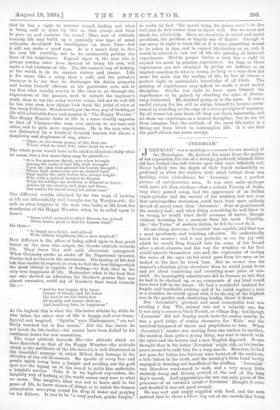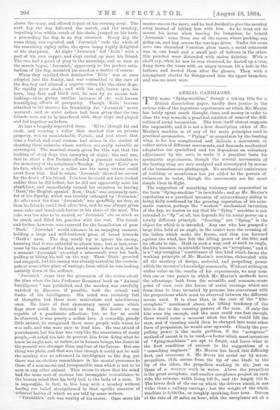JEREMIAH.'
JEREMIAH ' was a monkey, a common brown monkey of the Himalayas. He derived his name from the pathos of his expression, for out of a strange, puckered, wizened little old face looked two soft brown eyes that were infinitely sad, Never indeed was the depth of their liquid melancholy so profound as when the curious little mind behind them was devising some wickedness ; for Jeremiah' was a perfect picture of unregenerate man. It was once said—perhaps with more wit than wisdom—that a certain Viceroy of India, long since passed away, had the appearance of an Italian organ-grinder and the morals of his monkey, but not even that unscrupulous statesman could have been more entirely devoid of moral sense than ' Jeremiah.' Fear of punishment the monkey had; and when doing something he well knew to be wrong, he would utter shrill screams of terror, though without desisting for a. moment from his work. Possibly, like " the Twine" of modern fiction, he felt he must do it.
Of one thing, however, ' Jeremiah' was capable, and that was a most passionate and touching affection. He undoubtedly loved his master ; and it was pathetic to see the joy with which he would fling himself into the arms of his friend after a short absence, and the way the wrinkles on his face would smooth themselves out, and the expression of having the cares of the ages on his mind pass from his eyes, as he looked at the face he loved best. But no sooner was his master's attention given elsewhere than he would jump down and set about contriving and executing some piece of mis- chief. So incorrigibly mischievous did he become at last that he had to be chained up, or no ornaments of any kind would have been left in the house. He had a wonderful instinct for fragile and breakable articles, and if he could capture a vase or a tumbler, he would speed with it to the top of the highest tree in the garden and, chattering loudly, throw it down.
But Jeremiah's ' greatest and most remarkable feat was stealing a dog. The animal was not a valuable one, for it was only a common black Pariah, or village dog ; but though Jeremiah' did not display much taste for canine beauty, he was a good judge of canine character, for SAW was the sweetest-tempered of slaves and playfellows to him. When Jeremiah's' master was moving from one station to another, the monkey, then quite a young thing, was sent to march with the syoes and the horses, and a new English dog-cart. It was thought that in the latter' Jeremiah' might ride, as his tender years seemed to unfit him for a long march. However, he had not gone far before two buttons were twisted off the cushions, a hole bitten in the cloth, and the monkey's little hand busily engaged in drawing out handfuls of the stuffing. Jeremiah' was therefore condemned to walk, and a very weary little monkey, dusty and thirsty, arrived at the end of the long day's march. And apparently—for one can only guess at the processes of an animal's mind—' Jeremiah' thought it over, and decided it was not good enough. He was well and amply supplied with food, and the men noticed that he chose a black dog out of the crowds that hung about the camp, and offered it part of his evening meal. The next day the dog followed the march, and the monkey, beguiling him within reach of his chain, jumped on his back, a proceeding the dog in no way resented. Every day the same thing was repeated, and 'Jeremiah' rode the whole of the remaining eighty miles, the syces being highly delighted at his sharpness. At night ' Jeremiah' fed Kahl' with a part of his own supper, and slept curled up near his friend. The two had a game of play in the mornings, and as soon as the march began, Jeremiah,' apparently to the perfect satis- faction of the dog, mounted his steed as a matter of course.
When they reached their destination was at once adopted into the family, and was committed to the care of the dog-boy and allowed a regular ration like the other dogs. He rapidly grew sleek ; and with his soft, brown eyes, his keen, long face and black coat, he was by no means bad- looking—thus giving another instance of the well-known beautifying effects of prosperity. Though 'Kale' became attached to his master, his friendship for Jeremiah' never wavered ; and as strict orders had been given that the two friends were not to be interfered with, they slept and played and fed together as before.
At last a tragedy separated them. Kalil,' though fat and sleek, and wearing a collar that marked him as private property, was an unmistakable Pariah ; and just about that time a foolish and cruel custom had arisen in the station of shooting these animals, whose services are really valuable as scavengers. The nominal reason given for this was that the barking of stray dogs was annoying at night ; the real one, that to shoot a few Pariahs afforded a pleasant variation to the monotony of the subaltern's Sunday. So poor °Kahl' met his fate, which neither a collar nor his many virtues could avert from him. Sad to relate, Jeremiah' showed no sorrow for the death of his friend. It is true he could not have looked sadder than he did before, but he did not apparently miss his playfellow, and immediately turned his attention to teasing 'Dash,' the English spaniel. Now, Dash' was extremely care- ful of his dignity, which was terribly outraged by 'Jeremiah' At afternoon tea-time Jeremiah' was generally set free, as then hie friends could look after him, and he was always given some cake and bread-and-butter as his share of the meal. The cake was too nice to be wasted, so Jeremiah' ate as much as he could, and filled his pouches with the rest. The bread- and-butter, however, was reserved for the humiliation of poor ' Dash." Jeremiah' would advance in an engaging manner, holding a large and well-buttered piece of bread towards Dash's' nose. The dog would try to ignore his enemy, knowing that it was unlawful to attack him ; but at last, over- come by the smell of the food, would make a dart at it, and in a moment Jeremiah' executed a somersault over his back, pulling or biting his tail on the way. Then Dash' growled and snapped ; but his enemy was already seated on the curtain- pole or some other place of vantage, from which he was looking amiably down at the sufferer.
'Jeremiah' came into the possession of the writer about the time when the late Professor Romance' book on " Animal Intelligence" was published, and the monkey was carefully watched to discover, if possible, both the extent and limits of his intelligence. His mind was certainly full of thoughts, but these were malevolent and mischievous ones. No trace of that elementary moral sense which dogs show could be detected in him. No doubt he was capable of a passionate affection; bat, so far as could be observed, it was purely a selfish love. A. cowardly, greedy little animal, he recognised there were people with whom he was safe, and who were sure to feed him. He was afraid of punishment, but his fear was very like the conscience of many people,—it acted too late to prevent him from doing what he knew he ought not ; or rather, as in human beings, the desire in the present was stronger than any fear of the future. But one thing was plain, and that was that though it could not be said the monkey was as advanced in intelligence as the dog, yet there was an obvious resemblance in his mental processes to those of a non-moral and irresponsible man which is not to be seen in any other animal. This seems to show that his mini, had the same sort of curious but incomplete resemblance to the human mind that his body had to the body of a man. It is impossible, in fact, to live long with a monkey without having our belief strengthened in that apelike ancestor of arboreal habits of which we are told by some writers.
' Jeremiah's exit was worthy of his career. Once more his master was on the move, and he had decided to give the monkey away instead of taking him with him. As he went out to mount his horse when leaving the bungalow, he beheld Jeremiah ' come from one of the rooms where packing was going on, and hop across the carriage drive. Under his arms were two cherished Venetian glass vases, a metal ornament was in one hand and a small pair of bellows in the other. His pouches were distended with stolen dainties. With a shrill cry, when he saw he was observed, he darted up a tree, flung down the vases with an angry scream, bit a hole in the bellows and hurled them after the glasses. Then with a triumphant chatter he disappeared into the upper branches, and was no more seen.



































 Previous page
Previous page